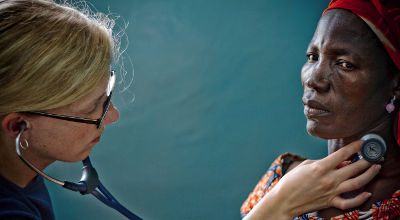Medical missions is dead. IMB no longer appoints medical personnel. Transitions of IMB-funded hospitals to local leadership are a failure.
These are just some of the myths circulating about Southern Baptist medical missions, says Dr. Charles Fielding,* a physician with more than 15 years of experience with IMB.
“We have more medical workers on the field now than ever before,” Fielding says. Today, more than 300 health-qualified personnel serve overseas.
The myths originated nearly 30 years ago when the Foreign Mission Board (now IMB) began transitioning away from medical institutions, explains Dr. Rebekah Naylor, an emeritus missionary surgeon who served for 35 years at Bangalore (India) Baptist Hospital.
“The reasons for the transition were both financial and philosophical,” Naylor says. “Financially, institutions are expensive to maintain. Philosophically, the leadership of the [IMB] believed that institutions were not the best and strongest way to accomplish evangelism and church planting.”
Making a Change
Consequently, in the mid-1980s, IMB began handing over control of its more than 30 hospitals and medical and dental clinics to local partners. A 1997 IMB report—the last publication identifying international institutions with Baptist ties—lists 17 hospitals, 10 medical clinics, six dental clinics and one school in places such as Brazil, Indonesia, Japan and Yemen. Today, IMB maintains only one—the Baptist Medical Centre in Nalerigu, Ghana.
Dr. Van Williams, an emeritus missionary physician and medical consultant for IMB, believes that the success of each transition was dependent primarily on the strength of the local partner.
“We’ve done it in different ways around the world,” Williams says. “Sometimes it worked. Sometimes it didn’t.”
Now national conventions, private boards or government organizations operate about half of the health care facilities included on the 1997 list, and in several instances IMB personnel continue to have some level of involvement. For the remainder, factors such as remote location, poor management or weak partnerships resulted in closure of the facilities. In each successful transition, however, “the hospital found a partner with the right strengths,” Williams explains. He cites three examples of “phenomenal transitions”—Wallace Memorial Baptist Hospital in Pusan, South Korea, Bangalore Baptist Hospital and the Baptist Medical Center in Asunción, Paraguay.
Appreciating Successes
For the hospital in Bangalore, the “right partner” was the Christian Medical College of Vellore, India. The college had an excellent teaching program that allowed it to expand the services offered in Bangalore. Under a management agreement with the medical college, the Bangalore hospital offers medical care to more than 200,000 patients a year. It also boasts a nursing school and provides training in allied health, X-ray and medical records management. The college manages the hospital through a board of directors; IMB retains one seat on the board and funds the pastoral care department.
In Paraguay and South Korea, national Baptist conventions in each country established private boards consisting of directors from missions, business and medical backgrounds. Under these arrangements, medical facilities broadened their influence within their communities while maintaining a Christ-centered mission.
For example, prominently posted in every ward of Bangalore Baptist Hospital is the mission statement to give care in the Spirit of Christ and draw people to Him. It is a philosophy embraced by every leader, says Naylor, noting that the chaplain’s office recorded 1,200 professions of faith in 2011. In other years, the number has been as high as 4,000.
In Pusan, hospital leadership not only maintains a Christ-centered mission within the hospital walls, it also extends its reach to some of the world’s most restricted areas. Building on the legacy of the hospital’s namesake—Dr. Bill Wallace, a Southern Baptist medical missionary to China — Korean medical personnel travel at least annually to other Asian countries, holding medical clinics in impoverished areas and sharing God’s love.
See an error in this article?
To contact us or to submit an article





















